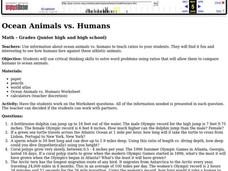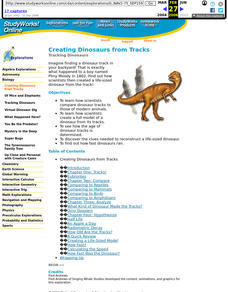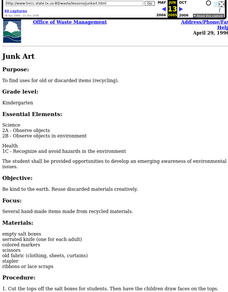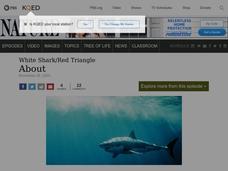Curated OER
Conserving Marine Life
Students discuss the different threats to various marine life. Through research, groups examine threats to specific marine life, evaluate the situation, and develop possible solutions to help marine life regain stability. Conservation...
Curated OER
Create an Underwater Scene
Students apply knowledge of underwater ocean life by creating an ocean life scene with marine animals and plants placed at appropriate ocean depths.
Curated OER
Ocean Animals vs. Humans
Students use critical thinking skills to solve word problems using ratios that allow them to compare humans to ocean animals.
Curated OER
Water Density and Stability Lab
Students observe how different water densities and salinity control the depth at which different water masses occur. Submarines are used as a case study. This is a well-designed with an excellent worksheet.
Curated OER
Creating Dinosaurs from Tracks
Students learn how scientists compare dinosaur tracks to those of modern animals, how scientists create a full model of a dinosaur from its tracks and how the age of dinosaur tracks is determined.
Curated OER
Follow Spring's Journey North Recording Highlights of the Season
Students scan headlines on the Journey North News Updates each day to track the changes that spring brings as it comes to different areas of the United States.
Curated OER
Dolphin Documentary
Students use their knowledge of dolphin natural history to create a "movie."
Curated OER
Stranded along the Coast
Students plot stranding sites onto a map using latitude and longitude as well as compass directions with respect to coastal features. They identify several species of marine animals that might become stranded; distinguish their...
Curated OER
Ask Jake the Sea Dog
Students access the ask-the-expert portion of the WhaleTimes.org website. They fill in the online form to submit a query of their choice and check their e-mail regularly for a response.
Curated OER
The Magic School Bus Goes Upstream
Students participate in an experiment that shows them how to use their senses to find their way "home." This experiment is based on the video that shows how salmon find their way to their home stream.
Curated OER
Oceanography
Second graders identify saltwater and freshwater habitats and the resources found in them. They compare and contrast the two habitats and discuss their findings. They discover the resources bodies of water can provide.
Curated OER
Adaptations
Students identify features of animals that enable survival in particular environments and group animals on the basis of their similarities. They compare and contrast features of groups of animals.
Curated OER
Monitor Marine Migrants
Students, in groups, track the seasonal journey of a species, such as a shorebird, sea turtle, or marine mammal, using various sources of migration data
Curated OER
TE Lesson: Caught in the Net
Learners student the concept of bycatch, the act of unintentionally catching certain living creatures using fishing equipment. They determine the difference between bycatch and target creatures. They discover what species become bycatch...
Curated OER
Animal Habitats
Students study the word habitat and its meaning. They also identify that in order for something to be classified as a habitat there needs to be the proper shelter, food, water, and space.
Curated OER
Observing and Discovering Using Our Senses
Third graders decide if it is possible to identify something using only the senses of taste, smell and hearing. They listen to a CD of animal sounds with their eyes closed and attempt to identify the animal. Next, they smell an air...
Curated OER
The Plant and Animal Walk
Students draw pictures and write words to describe objects and experiences. They observe outside and draw at least three animals and three plants. Students observe plants and animals describing how they are alike and how they are...
Curated OER
Shark Attack
Students examine the white shark. They think critically about a set of shark facts and predict whether the statements are true or false. Students describe a year in the life of a white shark living in the Red Triangle. They create a...
Curated OER
Snow on Sea Ice
Young scholars examine different samples of ice and predict the amount of snow that has fallen in a given year. Using a calculator, they graph the various thicknesses. They analyze the graphs to determine the relationship between the...
Curated OER
Sharks
Second graders identify and analyze the many types of sharks that can be found in the Great Barrier Reef in Australia. They also identify what the sharks eat for food, their habitats, and their constuction to the environment and the food...
Curated OER
Sharkland Wiki
Students, while researching the waters around southern Africa and viewing a video of the episode "Sharkland" from Thirteen's series NATURE, critique reliability of online resources and analyze the various components of a wiki. They...
Curated OER
The Environment and Animals
In this environment and animals worksheet, 7th graders match ten pictures with their actual titles, answer seven statements as true and false, and discuss six questions together.
Other popular searches
- Killer Whales
- Blue Whales
- Humpback Whales
- Baleen Whales
- Marine Science Whales
- Orca Whales
- Gray Whales
- Uses of Whales
- Language Arts Whales
- Beluga Whales
- Saving Right Whales
- Toothed Whales

























